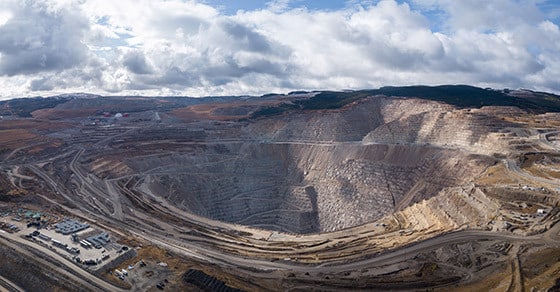President Biden has signed into law the Inflation Reduction Act of 2022. While the legislation is recognized as the most significant US investment in climate change in history, it also represents another essential step in building the nation’s critical mineral supply chain.
The law contains several provisions that will help to incentivize investment in domestic mining and mineral processing. As a preferred supplier of mineral processing equipment, we’re continuing to monitor the situation. Here’s a look at how the new Inflation Reduction Act could help the US mining industry.
How the Inflation Reduction Act Boosts Domestic Critical Minerals
The Inflation Reduction Act takes aim at several critical issues facing the nation, with a significant focus on tackling climate change and energy security through clean energy initiatives. The Administration expects these efforts will allow the US to achieve a 40% reduction in emissions by 2030.
While much focus is being paid to the law’s clean energy pursuits, the new legislation contains several provisions that will also help to boost a domestic supply chain for critical minerals, a growing priority for the administration and an essential component to meeting clean energy goals.
The key provisions that will also boost domestic critical mineral investment include:
The Advanced Manufacturing Production Credit
The Advanced Manufacturing Production Credit provides incentives to companies manufacturing the materials and components used to produce clean energy. This includes critical minerals.
Under the Advanced Manufacturing Production Credit, miners producing critical minerals will now be eligible for a tax credit, an equivalent of ten percent of the production costs for each eligible component.
Updates to the EV Tax Credit
The Inflation Reduction Act also makes updates to the electric vehicle (EV) tax credit to make EVs more affordable and accessible.
In order for a vehicle to be eligible for the full new vehicle $7,500 tax credit, however, EV manufacturers, beginning in 2023, must either source a minimum of 40% of the battery materials from the US or free trade agreement partners, or recycle it in North America. This sourcing requirement is incrementally increased each year, reaching 80% by 2027.
While some in the industry criticize this tight deadline, others view it as a way to jumpstart a much-needed domestic battery supply chain and the onshore production of critical minerals.
Others are hoping that these EV material sourcing requirements will also help to incentivize increased metals recycling efforts in the nation to provide responsibly sourced metals and materials for EV battery production.
Enhanced Use of the Defense Production Act
The law also allocates $500 million to the Defense Production Act. This is in addition to those funds already made available for fiscal year 2022. This money will remain available until September 30, 2024.
In the first quarter of 2022, President Biden invoked the Defense Production Act as a way to increase domestic mining and processing for critical materials needed for supplying the production of large-capacity batteries.
Department of Energy’s Innovative Technology Loan Guarantee (Title XVII)
The law also makes an additional $40 billion in commitment authority available to the DOE’s Innovative Technology Loan Guarantee (Title XVII) program. The Title XVII program continues to be explored as a way to support projects that bolster a domestic supply of critical minerals.
These provisions provide important incentives toward making domestic production of critical minerals a reality. Along with the Department of the Interior’s recent commitment to map the nation’s critical minerals, and the founding of the Minerals Security Partnership, or MSP, they send a clear message that a domestic supply chain for critical minerals is a top priority for the nation.
In addition to all of this, the Department of Energy has opened up for public comment on how best to utilize the $675 million made available for critical materials R&D through the Bipartisan Infrastructure Law.
Conclusion
The Inflation Reduction Act represents landmark legislation in the nation’s fight against climate change and the transition to clean energy, but it also provides essential new opportunities for investing in the nation’s critical minerals supply chain.
FEECO remains a vital resource to the mining and mineral processing industry, with process development services, custom process equipment, and comprehensive parts and service support. For more information on our capabilities in the mining industry, contact us today!


